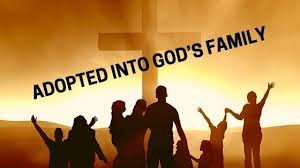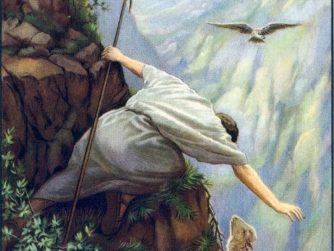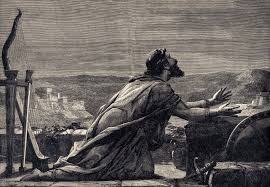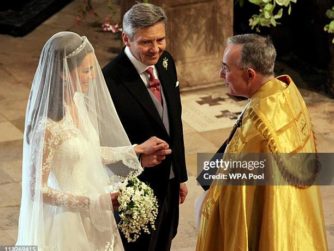From Corruptible Inheritance (Flesh) to an Incorruptible Inheritance (Sure House and Kingdom)
Excerpt from the e-book – “The Presence of God: Foundation for Adoption, Inheritance, and the Eternal Kingdom” by Sunday Oladiran
To understand the significance of Solomon’s birth and his role in God’s redemptive plan, we must understand the ancient principle of redemption through adoption—most clearly seen in the law of levirate marriage (Deuteronomy 25:5–10). When a man died without a son, a kinsman was to marry his widow to redeem her dead brother’s lineage, and the firstborn son from that union would be considered the son of the deceased. This preserved the dead man’s name, inheritance, and place among God’s people. It was not merely a cultural custom but a divine sign of redemption and covenant continuity.
This principle finds its deepest fulfilment in Jesus Christ—the eternal Firstborn whom God offered to redeem the children of Adam, dead in sin, and to raise us from corruption into an incorruptible inheritance. Our redemption is not grounded in flesh, bloodline, or human effort, but in sacrifice and adoption through Christ.
The story of David, Uriah, and Solomon illuminates this truth in a profound way. Though David was not a blood relative of Uriah the Hittite, they were united by covenant fellowship of the brethren under God’s presence. Uriah, a Gentile, had been grafted into Israel by faith, standing with the Ark of God even unto death. This reflects the redemption and adoption of the Gentiles or strangers into God’s family through Christ. In this light, David’s union with Bathsheba carried redemptive weight.
David’s marriage to Bathsheba—Uriah’s widow—under God’s mercy, produced Solomon. Though this union was born from sin, God’s redemptive mercy turned it into a prophetic picture of adoption: Solomon became the heir, not just of David’s throne, but of a new house for David and Uriah built on mercy, not merit. Solomon, like the sons raised up in levirate marriages, represented the continuity of a name and inheritance of Uriah, thus Uriah was mentioned in the genealogy of Jesus in the gospel of Matthew, Matt 1:6.
The Incorruptible Inheritance: A New Household in Christ
Scripture repeatedly shows that God’s eternal plan of redemption was to raise up a new household—not through the corruptible seed of flesh, but through the incorruptible seed of the Spirit (1 Peter 1:18–19). 1 Peter 1:18–19 makes it clear: our redemption came not from corruptible things like silver or gold, but by the precious, unblemished blood of Christ. Though He was foreordained before the foundation of the world, He was revealed in these last days for us—for Gentiles and Jews alike.
This glorious redemption was prophetically foreshadowed in the Old Covenant through several symbolic acts of raising up firstborn sons to preserve the names of the dead:
- Seth, Adam’s son, stepped into the stead of Abel (a duty assigned to him by God) raised up Enos as his firstborn—redeeming Abel, to continue a godly line (symbolizing the redemption of all people). The Bible does not mention if Abel was married, again pointing to the symbolic nature of the act.
- Judah, who through his daughter-in-law Tamar, fathered Pharez as his firstborn – redeeming his deceased son, Er (symbolizing the redemption of the Hebrew).
- Boaz, who married Ruth, the widow of Mahlon, raised Obed as his firstborn—redeeming Mahlon’s names and inheritance (symbolizing the redemption of the Hebrew).
- David, who took Bathsheba, the wife of Uriah the Hittite, and fathered Solomon, the firstborn from their union – redeeming Uriah (symbolizing the redemption of the Gentiles through Uriah).
Each of these firstborn sons ‘raised up’ in the name of the dead ultimately foreshadows Christ—the true and eternal Firstborn who redeems both Jew and Gentile. But not all men embraced this redemption.
God’s redemption plan has been foreshadowed from the beginning. You are without excuse if you miss such a great salvation
When Gentiles draw near to God in faith, they are not cast away (Isaiah 56:6–7; John 6:37; Romans 10:12–13). Rather, they are received as sons and daughters into His incorruptible inheritance. Uriah the Hittite, a Gentile by birth, reflects this truth. Though a stranger, he cherished God’s presence at the battlefront more than the comfort and privilege of the king’s palace. Even when the Israelites — those of the bloodline of the Messiah — neglected him and left him exposed to the enemy at the battlefront in God’s presence, Uriah remained loyal A Psalm of Uriah (One of King’s David mighty men). He honoured God above all else and stood firm where many of Israel spiritually fell.
This mirrors Paul’s deep burden in Romans 9:3–5. Though Israel was chosen and given the covenants, promises, and the law, they missed their own Messiah. Yet through Israel’s stumbling, the Gentiles have been grafted in (Romans 11:11–12). Uriah’s faithfulness—choosing the presence of God and fellowship with the brethren even unto death, despite being betrayed and left to die by Israel—foreshadows how the Gentiles entered the kingdom through Israel’s rejection of Christ.
“I was found by people who were not looking for me. I showed myself to those who were not asking for me.” – Romans 10:20
God’s promise to Israel has not failed. A remnant remains, chosen by grace (Romans 11:5). The eventual restoration of Israel is central to His redemptive plan.
God loves you (Gentiles or Jews) and He has paid the ultimate sacrifice for your redemption. Your self-righteousness will not save you. Jesus is the only way for your salvation and you must see him by faith
Adoption and Inheritance: The House of the Flesh vs. the House of Promise
David’s first household — children born of the flesh (Amnon, Absalom, Adonijah) — fell under judgment and could not secure the kingdom. But God, in His mercy, raised up a house through Solomon, a son born through a redemptive and symbolic union—much like a levirate act—with Bathsheba, Uriah’s widow. This act prefigures God’s adoption of the Gentiles and the building of a spiritual house not by flesh or blood, but by the promise.
“For not all who are descended from Israel are Israel… it is not the children by physical descent who are God’s children, but it is the children of the promise who are regarded as Abraham’s offspring.” – Romans 9:6–8
Your first birth from your parents is corrupt and has sold you into sin; only through repentance and faith in Jesus Christ can you be adopted into God’s promised household.
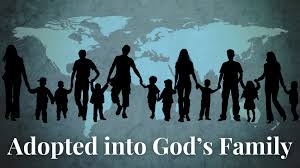
Solomon, though of Israelite blood, was born through a story of mercy and peace, foreshadowing Christ. Like Jesus, Solomon bore the weight of a kingdom uniting—Jews and Gentiles symbolically reconciled through his kingship. Through him, both Uriah (a Gentile) and David (the Israelite) were honored in legacy, pointing to Christ who made peace between both groups:
“For He Himself is our peace, who has made the two groups one and has destroyed the barrier, the dividing wall of hostility… His purpose was to create in himself one new humanity out of the two, thus making peace.” – Ephesians 2:14–16
“I will bless those who bless you… and all peoples (Jews and Gentiles) on earth will be blessed through you.” – Genesis 12:3
“He redeemed us in order that the blessing given to Abraham might come to the Gentiles through Christ Jesus, so that by faith we might receive the promise of the Spirit.” – Galatians 3:14
Salvation is not by merit, nor by the will or works of the flesh. Adoption into God’s family is not earned by merit or fleshly lineage.
It was not Absalom or Adonijah who secured the house, but Solomon — a son of divine mercy – the house of promise.
“What shall we say then? That the Gentiles, who did not pursue righteousness, have attained it… but Israel, pursuing the law of righteousness, has not attained it… because they did not seek it by faith” (Romans 9:30–32).
Just as many Israelites sided with the seed of the flesh—Absalom and later Adonijah—over God’s chosen one, so too have many missed the true inheritance by clinging to works and merit rather than faith.
But Scripture assures:
“As Scripture says, ‘Anyone who believes in him will never be put to shame.’ For there is no difference between Jew and Gentile—the same Lord is Lord of all and richly blesses all who call on him.” – Romans 10:11–12
So when David the King was rejected by his people the Israelite, due to Absalom’s rebellion and he ran out of Jerusalem, the gentiles in the army also stood with David with some faithful Israelitse. The gentiles – all the Cherethites, all the Pelethites, Ittai, the Gittites, 600 men (from Gath) also came in and were involved in the restoration of David as King during Absalom’s rebellion.
2 Samuel 15:18–22 describes how David was fleeing Jerusalem due to Absalom’s rebellion, all the Cherethites, all the Pelethites, and the Ittai the Gittite, 600 men from Gath (a Philistine city, indicating they were Gentiles) came to accompany him. David even gave Ittai the option to return to Jerusalem and join Absalom, for he was a stranger and exile in the land not quite long. He does not want him to share in his hardship, to leave certainty for uncertainty, not to leave the pleasure he came to seek in Jerusalem, but Ittai replied:
“As surely as the Lord lives, and as my lord the king lives, wherever my lord the king may be, whether it means life or death, there will your servant be.” — 2 Samuel 15:21
Is your devotion to God like Ittai the gentiles? Do you turn back from Jesus the King when things are dark and uncomfortable.
Salvation is by faith—both for Israel and the nations. David, by faith, raised up a name for dead Uriah through Solomon. And in Solomon’s kingdom, both Uriah (symbol of the Gentiles) and David (Israel) were reconciled in peace.
“But because of his great love for us, God, who is rich in mercy, made us alive with Christ even when we were dead in transgressions—it is by grace you have been saved.” – Ephesians 2:4–5
So then, we who have believed, whether Jew or Gentile, are now part of that incorruptible inheritance—adopted not by law, but by grace through faith in Jesus Christ, our eternal Redeemer.
Have you been Redeemed by the Blood of Christ?
The Cost of Discipleship
Elimelech’s nearer kinsman was willing to buy Naomi’s husband land but refused to marry Ruth because it meant raising a child in Mahlon’s name—losing his own claim to the inheritance. He missed the opportunity to be a figure of God who offered his firstborn and only son to redeem the fallen humanity. However, this purchased inheritance might not be in his name, but it was in his custody to keep. He prized the visible and perishable above the invisible and eternal. Although Boaz was not the nearest kinsman to Elimelech, he sacrificially stepped in, marrying Ruth and raising up Obed in Mahlon’s name. The closer kinsman declined, unwilling to risk losing his own estate and name. He valued his earthly inheritance more than God’s redemptive call.
You cannot love the things of this world and love God, you must choose one.
God bore the cost of redemption on Jesus so that redemption is free. It demands laying down self-interest for the sake of another’s legacy. Christ, our greater Boaz and Obed, laid aside heaven’s glory, bore our sin, and offered His blood to redeem us—not just into God’s presence, but into His family.
Don’t waste your time and life chasing the treasures of this world—where moth and rust destroy. Instead, lay up your treasure in heaven by surrendering your life to Jesus and seeking his kingdom alone.
This is the tragic choice many make today: following Jesus only when it doesn’t threaten their earthly ambitions, comforts, or self-image. They seek the land like Elimelech’s nearer kinsman, but reject the cross. But Jesus did not redeem land—He redeemed souls. He bore the full weight of our corruption to bring us into a kingdom that cannot be shaken.
Your soul is bound by sin and destined for eternal damnation, but Jesus came to redeem your condemned soul from sin and the corruption of this world.
David, once led by the flesh, ultimately embraced this redemptive pattern. Though his first household was marked by the sword—symbolizing the judgment on the flesh (2 Samuel 12:10–12)— God raised Solomon as the beginning of a new, restored line. David’s corruptible house, like our old man in Adam, could not inherit the promises of God. But the house established through Solomon—a figure of Christ—became the vessel for God’s eternal kingdom.
The flesh cannot please God. If you sow to your flesh, you will reap corruption. Be Redeemed and walk in the Spirit of Christ!
This “sure house” was not David’s achievement, but God’s gift—rooted in mercy, secured by covenant, and pointing to Jesus, the Son in whom God’s promises find fulfilment. As Paul writes, “What do you have that you did not receive? And if you did receive it, why do you boast as though you did not?” (1 Corinthians 4:7). All that we are and possess, including our adoption into God’s family, is by grace. We are not our own – We were bought with a price (1 Corinthians 6:20).
The question remains: what corruptible thing are you clinging to that is keeping you from receiving the incorruptible inheritance in Christ? Lay it down. Like David, embrace the loss of the flesh revealed through his first household that you may gain the riches of God’s eternal house.
Count the Cost: Lose All to Gain All
“Salvation is free, but discipleship costs everything.” Billy Graham
He is no fool that loses what he cannot keep to gain what he cannot lose (Matthew 16:25). Jim Elliot
Jesus said:
“Whoever loves father or mother more than Me is not worthy of Me… whoever does not take up his cross is not worthy of Me” (Matt. 10:37–39).
“If anyone comes to Me and does not hate his father, mother, wife, children… yes, even his own life, he cannot be My disciple” (Luke 14:26).
Jesus emphasizes the importance of prioritizing one’s relationship with Him above all else, including family ties. This doesn’t mean literal hatred but rather a willingness to put one’s commitment to God above all other relationships. These are hard truths. Also, the rich young ruler could not sell all that he had – his earthly treasure to secure a heavenly treasure. He could not follow the firstborn son- Jesus – so he could be His disciple and exchange his vain life for eternal life. But Boaz embraced the cost. David, in repentance, embraced the cost. And Jesus, above all, bore the full weight of the cost—giving His own incorruptible life to redeem us.
Have you counted the cost? It pays to serve Jesus than all the pleasures of this world
Prayer Burden
Lord, I release myself to you, please be my Lord and Saviour. All that I count gain, they are loss to me now so that I may gain Jesus Christ.


